Why Taiwan is the most exciting market in Asia
Taiwan has lagged behind much of Asia in recent years. But this could soon change – in fact, Taiwan looks like it may well hold some of the most exciting investment opportunities in Asia. Cris Sholto Heaton explains why, and looks at how to invest in 'Asia's Switzerland'.

Get the latest financial news, insights and expert analysis from our award-winning MoneyWeek team, to help you understand what really matters when it comes to your finances.
You are now subscribed
Your newsletter sign-up was successful
Want to add more newsletters?

Twice daily
MoneyWeek
Get the latest financial news, insights and expert analysis from our award-winning MoneyWeek team, to help you understand what really matters when it comes to your finances.

Four times a week
Look After My Bills
Sign up to our free money-saving newsletter, filled with the latest news and expert advice to help you find the best tips and deals for managing your bills. Start saving today!
The main problem with Taiwan's economy becomes apparent as soon as you land at Taoyuan airport. As you leave the rather spartan terminal, you look in vain for the signs pointing you to a metro link into the capital city, Taipei, before you remember that there isn't one. Your only option is a time-consuming bus or taxi ride to the local railway station, or directly into the capital.
A lack of investment has left Taiwan lagging behind much of Asia in recent years. The combination of the rise of China and the country's peculiar political situation has left this former tiger economy looking decidedly weak compared with peers such as Hong Kong and Singapore.
The good news is that this is very likely to change in the next few years. And that makes Taiwan one of the most interesting investment opportunities in the region
MoneyWeek
Subscribe to MoneyWeek today and get your first six magazine issues absolutely FREE

Sign up to Money Morning
Don't miss the latest investment and personal finances news, market analysis, plus money-saving tips with our free twice-daily newsletter
Don't miss the latest investment and personal finances news, market analysis, plus money-saving tips with our free twice-daily newsletter
How Taiwan became a modern economy
To understand Taiwan, you need to know something about its history and relations with China. When Chiang Kai-shek and the Kuomintang lost the Chinese civil war to Mao's Communists in 1949, they evacuated to Taiwan along with much of the country's wealth. There they sat for many decades, plotting ways to retake the mainland and trying to persuade the US government to help them.
That never happened. But while China suffered during the Great Leap Forward and the Cultural Revolution under its unhinged Great Helmsman, Chiang achieved what he'd failed to do for the whole of China, and rapidly modernised Taiwan's economy.
Following the now-familiar pattern, the island began as an exporter of low-cost goods such as textiles and moved up the value chain to be a centre of the global electronics industry today. GDP grew at an average of 8% a year between 1951 and 2007 (see figure 1 below), reaching a per capita level of around $31,000 at purchasing power parity, which adjusts for differences in the cost of living between countries (by comparison, the UK is around $36,000 and the US around $47,000).
Figure 1. Taiwan year-on-year real GDP growth rate, 1951-2010 (f)
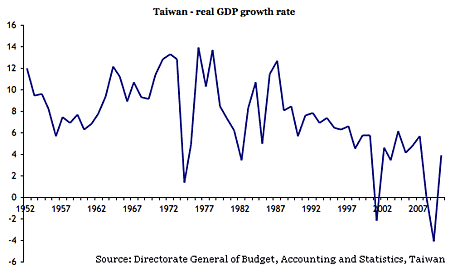
Meanwhile Chiang's repressive dictatorship gave way to democracy in 1996 under Lee Teng-hui. Mainland China continued to regard the island as a renegade province; however commitments from the US to support Taiwan if it was attacked prevented any attempts to bring it back under control by force.
The rise of China came at a price for Taiwan
So far, so good. But as China industrialised, investment that had previously gone into Taiwanese industry began to flow to there instead. This wasn't just foreign firms; Taiwanese manufacturers began to relocate their factories to the mainland to take advantage of lower wages there. The profits they earned from this were often not repatriated to Taiwan but held offshore. Meanwhile, local investors have pulled their money out of the Taiwanese market in search of more exciting opportunities overseas.
The result: Taiwan has suffered a substantial net outflow of capital in recent years (see figures 2 and 3 below) and investment has slid to one of the lowest levels in Asia, above only the Philippines.
Figure 2. Net direct and portfolio investment flows into Taiwan, 1981-2009 (H1)
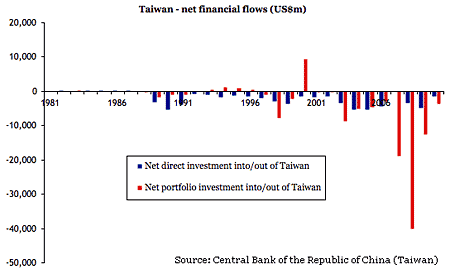
Figure 3. Taiwan net new investment relative to GDP, 1951-2010 (f)
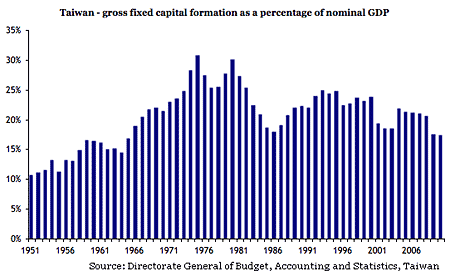
Meanwhile, the loss of jobs to the mainland meant that wages stagnated despite the still-healthy headline growth in GDP (see figure 4 below).
Figure 4. Taiwan real monthly earnings (average across all sectors)
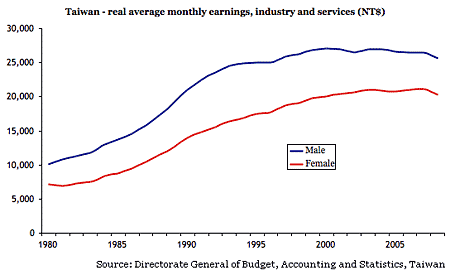
How Taiwan can turn this around
But just as China has been the problem, it's also likely to be the solution. Since the election of President Ma Jing-yeou last year, relations with Beijing have improved enormously. Direct flights between Taiwan and China now run regularly; previously you had to travel via Hong Kong. Restrictions on investments in both directions have been loosened and a free trade agreement is likely to be finalised within the next few months.
Better ties with China should help reverse the capital flows out of Taiwan for two main reasons. First, this will open the way to the next obvious step in the island's evolution; to become a specialist in research and development (R&D) and high-end manufacturing, and work in conjunction with lower-cost manufacturing in China.
This is what successful Taiwanese firms already do, so life will become easier for them. But foreign firms are also likely to set up bases in Taiwan for the same reason. The island still offers several advantages over China when it comes to highly-skilled work: education levels are better, English is widely spoken and the higher quality of life is more attractive for expatriate staff.
Second, there's likely to be significant investment from China into Taiwan now that restrictions have been eased. Part of this will be so that Chinese companies can use Taiwan as a skills centre in the same way as other firms but political pressure from the Chinese government will also play a big part. When it comes to ways of persuading the Taiwanese to look more warmly on Beijing, bribery stands head and shoulders above any other option. China Mobile's agreement to take a 12% stake in Taiwan's number three mobile operator Far Eastone is an early indication of what we can expect.
Taiwan - the Asian Switzerland
But R&D is not the only way for Taiwan to evolve. Tourism is likely to be an increasingly important part of the economy. Taiwan is already popular with Japanese tourists, attracted by its hot spring resorts and spectacular mountains. But the big growth market is likely to be China. Visits have from there have soared (see figure 5 below) since the two governments agreed to allow mainland tour parties in 2008, helped by heavy promotion from the Chinese government, which again sees this as a way of improving ties.
Figure 5. Taiwan's Chinese tourist boost
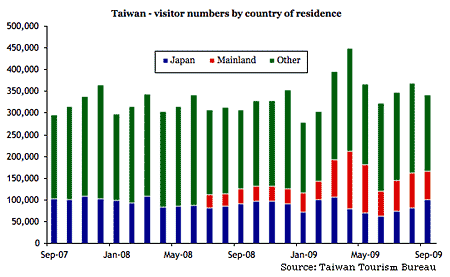
But in the longer run, I think there's an even more interesting angle to this. The same traits that make Taiwan attractive for tourists mean it has the potential to become the Switzerland of Asia a home for the wealthy, especially the newly rich of China.
This influx would benefit the whole economy, but would have an especially strong impact on property prices, just as we're seeing in Hong Kong at present. (So far, mainland Chinese individuals are not allowed to buy residential property, but that seems certain to change in due course.)
There are several key criteria for this possibility to reach its full potential. One is that Taiwan needs to have a Swiss-style pristine environment. A few years ago, that would have sounded unlikely; the island had severe pollution problems from decades of industrialisation. But efforts to clean up the air and rivers are paying off; during my latest visit, Taipei seems no more polluted than London, and conditions are starting to look pretty good in comparison with other parts of Asia.
Secondly, the country will need excellent infrastructure. And despite some obvious gaps such as the airport link, huge progress is being made here. A new high speed rail service, based on Japan's Shinkansen, or bullet train, now runs from Taipei in the north to Kaohsiung in the south. While the company that runs it is experiencing the usual Eurotunnel-style financial problems typical of these projects, there's no doubt that it's an impressive system that should deliver long-term benefits. The 200-mile journey takes just 90 minutes, down from 4.5 hours before.
Elsewhere, Taipei built an efficient metro system from scratch in the 1990s and is still extending it; by 2013 this will finally include a direct link to the airport. Other areas have further to go, but progress is being made; Kaohsiung opened its first two metro lines last year.
Coming to terms with China
The last step will probably take the longest: settling the cross-straits relationship. China has no apparent desire to exercise direct control over the island (the one country-two systems formula used for Hong Kong and Macau was originally developed as a proposal to Taiwan), but it cannot accept Taiwan being officially independent, not least because this would encourage independence movements elsewhere in China.
The majority of the Taiwanese population do not want to be governed by Beijing, even under a one country-two systems solution. At the same time, support for full independence is generally low, partly because it would inevitably mean war and partly because many still feel some ties to the mainland.
In short, the current situation of de facto independence seems to suit both sides at the moment, but in the long run a formal peace agreement will be necessary. The tricky part will be coming up with a framework that's acceptable to both sides and allows both to claim to have secured their goals. How this will be done is impossible to say, but recent trends suggest the desire to wrap things up is there. Indeed, President Ma has said he would like to see some kind of deal while he's in office.
Once this is done and the benefits that better ties with China will bring are clear, attitudes towards Taiwan are likely to change a lot. Indeed, I think there's a significant chance of a major Taiwan bubble in the next few years as investors latch on to this story.
Conversely, the main risk with investing in Taiwan is that this doesn't work out and relations deteriorate again. The worst-case scenario, while extremely unlikely, is war; given the US commitment to protect Taiwan, this would have global consequences.
How to invest in Taiwan
So if you find the Taiwan story as intriguing as I do, what are the options for investing there? There are six exchange-traded funds (ETFs) listed around the world. Five of them track the MSCI Taiwan index, while the other holds the 50 largest stocks in the market. Providers include iShares and Deutsche Bank (see the table below for a full list). You should be aware however that buying these would give you a heavy weighting towards technology (around 60%).
Foreigners are allowed to buy Taiwanese shares, but it's not the easiest exchange to access, which is the main reason it's still classed as an emerging rather than developed market. Consequently, few brokers currently offer Taiwanese stocks. UK investors could try Redmayne Bentley or look at opening an account with Hong Kong online broker Boom (I'll take a look at which brokers give you access to which markets in next week's email).
This would also let you buy the handful of custom ETFs listed in Taiwan, which could be useful if you want exposure to specific sectors. But you might want to wait on these, since it's possible that Taiwan ETFs will become significantly easy to access in the near future. Following recent rule changes, one Taiwan ETF has already cross-listed in Hong Kong and more could follow.
Elsewhere, there are two US-listed Taiwan investment trusts. The Taiwan Greater China Fund (NYSE: TFC) invests in Taiwanese companies that derive a large proportion of their profits from operations in China, on the basis that higher corporate governance standards and transparency in Taiwanese firms make this a better alternative to investing directly in China. Independently managed, it has around $70m in assets under management and trades at a discount to net asset value of 8.5%. The total expense ratio last year was 2.4% of assets under management.
The Taiwan Fund (NYSE: TWN) has a broader focus on the overall Taiwanese economy. Managed by HSBC, it has around $275m in assets under management and trades at a discount to net asset value of 9%. The TER was 1.7% of assets under management.
There are also few Taiwan-specific unit trusts. Not all of these will be available to investors in all regions, but two that should be widely accessible are from Fidelity and JP Morgan. As ever, if you're investing in a unit trust, you should look at doing so through a funds supermarket to avoid the indefensible 5% entry fees that the industry still somehow gets away with.
Table: Selected Taiwan funds
TABLE.ben-table TABLE {BORDER-BOTTOM: #2b1083 3px solid; BORDER-LEFT: #2b1083 3px solid; FONT: 0.92em/1.23em verdana, arial, sans-serif; BORDER-TOP: #2b1083 3px solid; BORDER-RIGHT: #2b1083 3px solid}TH {TEXT-ALIGN: center; BORDER-LEFT: #a6a6c9 1px solid; PADDING-BOTTOM: 10px; PADDING-LEFT: 5px; PADDING-RIGHT: 5px; BACKGROUND: #2b1083; COLOR: white; FONT-WEIGHT: bold; PADDING-TOP: 10px}TH.first {TEXT-ALIGN: left; PADDING-BOTTOM: 5px; PADDING-LEFT: 2px; PADDING-RIGHT: 2px; PADDING-TOP: 5px}TR {BACKGROUND: #fff}TR.alt {BACKGROUND: #f6f5f9}TD {TEXT-ALIGN: center; BORDER-LEFT: #a6a6c9 1px solid; PADDING-BOTTOM: 5px; PADDING-LEFT: 2px; PADDING-RIGHT: 2px; COLOR: #000; PADDING-TOP: 5px}TD.alt {BACKGROUND-COLOR: #f6f5f9}TD.bold {FONT-WEIGHT: bold}TD.first {TEXT-ALIGN: left}
| Axa-BNP EasyETF TSEC Taiwan 50 | 0.60% | FR, FR$ |
| Commerzbank ComStage MSCI Taiwan | 0.60% | DE |
| Deutsche Bank x-trackers MSCI Taiwan | 0.65% | CH, DE, FR, GB, GB$, HK, IT, SG |
| Fubon FTSE Taiwan Technology Tracker | 0.44% | TT |
| Fubon MSCI Taiwan | 0.34% | TT |
| Fubon Taiwan Eight Industries [ex Tech, ex Finance] | 0.44% | TT |
| Fubon Taiwan Finance | 0.44% | TT |
| iShares MSCI Taiwan | 0.74% | CH, DE, FR, GB, GB$, IT, NL |
| iShares MSCI Taiwan | 0.63% | AU, US |
| Lyxor MSCI Taiwan | 0.65% | CH, FR, HK, IT, SG |
| Polaris P-Shares MSCI Taiwan Financials | 0.50% | TT |
| Polaris P-Shares S&P Taiwan Custom China Play 50 | 0.49% | TT |
| Polaris P-Shares Taiwan Dividend Plus | 0.48% | TT |
| Polaris P-Shares Taiwan Electronics Tech | 0.46% | TT |
| Polaris P-Shares TSEC Taiwan Non-Tech 50 | 0.50% | TT |
| Polaris Taiwan Mid-Cap 100 | 0.48% | TT |
| Polaris Taiwan Top 50 | 0.38% | HK, TT |
| Taiwan Greater China Fund | 2.40% | US:TFC |
| Taiwan Fund | 1.70% | US:TWN |
| Fidelity Funds Taiwan A (min $2,500) | 2.06% | Row 19 - Cell 2 |
| JP Morgan Funds JF Taiwan A (min $2,000) | 1.90% | Row 20 - Cell 2 |
This article is from MoneyWeek Asia, a FREE weekly email of investment ideas and news every Monday from MoneyWeek magazine, covering the world's fastest-developing and most exciting region. Sign up to MoneyWeek Asia here
Get the latest financial news, insights and expert analysis from our award-winning MoneyWeek team, to help you understand what really matters when it comes to your finances.

Cris Sholt Heaton is the contributing editor for MoneyWeek.
He is an investment analyst and writer who has been contributing to MoneyWeek since 2006 and was managing editor of the magazine between 2016 and 2018. He is experienced in covering international investing, believing many investors still focus too much on their home markets and that it pays to take advantage of all the opportunities the world offers.
He often writes about Asian equities, international income and global asset allocation.
-
 Early signs of the AI apocalypse?
Early signs of the AI apocalypse?Uncertainty is rife as investors question what the impact of AI will be.
-
 Reach for the stars to boost Britain's space industry
Reach for the stars to boost Britain's space industryopinion We can’t afford to neglect Britain's space industry. Unfortunately, the government is taking completely the wrong approach, says Matthew Lynn